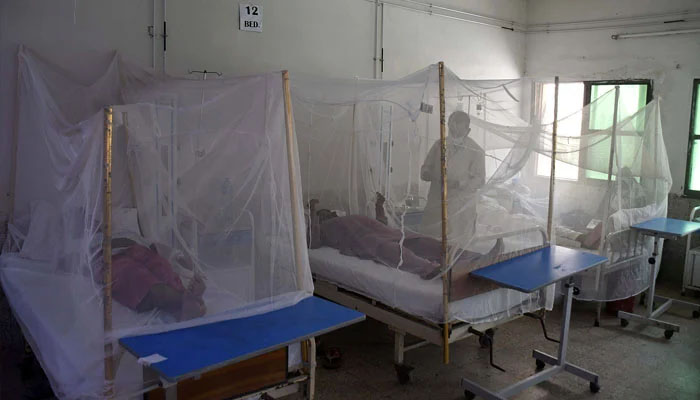Ministry of Health seeks permission for mosquito nets procurement from India
So far 80,000 cases have been reported from flood-hit areas of Sindh till September 20, says NMCP officials
September 22, 2022

- Mosquito nets are desperately needed in flood-affected districts of Sindh and Balochistan.
- Health experts also urges authorities to immediately arrange anti-malaria drugs.
- Over 3,500 cases of malaria are being reported daily from Sindh’s flood-affected districts alone, says NMCP.
The Ministry of Health on Wednesday has asked the government to grant permission for the procurement of mosquito nets from India, Geo News reported.
According to National Malaria Control Programme (NMCP), in 26 districts of the country Malaria is spreading rapidly therefore, 7.1 million mosquito nets are required on an urgent basis.
“During this current month, around 80 thousand cases of Malaria have been reported of which 22 per cent belongs to deadliest ‘Plasmodium falciparum’ type,” it said.
According to the report published in The News, Malaria testing kits, anti-malarial drugs and mosquito nets are desperately needed in the flood-affected districts of Sindh and Balochistan, where hundreds of cases of Plasmodium Falciparum, the deadliest type of malaria, are being reported among men, women and children, public and private health experts said.
Health experts also urged the authorities to immediately arrange anti-malaria drugs and mosquito nets to prevent the loss of life in the flood-affected areas of the country.
The NHS official asserted that they had requested the Global Fund for the arrangement of mosquito nets for the 26 most-affected districts of Sindh, Punjab and Baluchistan, where Plasmodium Falciparum cases were humongous and in response, the Global Fund offered to procure these nets from India if the government of Pakistan allows its procurement from its arch-rival neighbouring state.
“We have written a letter to the Ministry of Commerce to grant permission for procurement of mosquito nets from India. If allowed, the Global Fund has assured us of arranging the required number of mosquito nets within a few days,” an NHS official added.
Urging the government to relax ‘malaria treatment guidelines’ temporarily, Infectious Diseases experts at the Aga Khan University warned of a ‘large number of mortality in the flood-affected districts of Sindh and other provinces, as neither malaria testing kits, anti-malarial drugs nor mosquito nets were available to prevent the spread of malaria among the flood victims across the country.
“Malaria is fast emerging as a significant public health challenge in flood-affected areas. The problem is hugely compounded by the lack of availability of malaria testing kits and anti-malarial drugs. The national guidelines encourage confirmatory tests before treatment of malaria, whenever possible. Of course, if there are no testing kits available, then how can one do the confirmatory test?” questioned Prof. Asad Ali, a leading paediatric infectious diseases expert associated with the AKUH.
Talking to The News, Dr Asad Ali, who is also the Associate Dean of Research at the AKU, said daily thousands of cases of Malaria were being reported from the flood-affected areas and added that unfortunately, due to the unavailability of testing kits, no confirmatory tests were being carried out and no treatment was being given to the patients.
“The scope of the problem can be imagined by the fact that on the first day, when we finally got some malaria diagnostic kits at a health camp in Matiari in rural Sindh, this week, five of the nine children tested positive for malaria. The next day, four out of six children tested turned out to be positive for malaria. Three of these positive ones were of Vivax type, and one was Falciparum type,” Dr Ali informed.
“Thankfully, we had some antimalarial in our health camp, and these children were promptly treated. I dread to imagine what is happening with hundreds of other children with malaria who are neither getting tested nor treated,” he observed.
He maintained that there was an urgent need for widespread provision of malaria diagnostic kits and anti-malarial drugs in the flood-affected areas.
“Guidelines also need to be temporarily relaxed, and doctors should be encouraged to empirically treat patients with a high degree of suspicion in case the diagnostic kits are not available. Our population is already suffering, so let’s do our best to reduce some of their preventable sufferings,” he urged.
On the other hand, the National Malaria Control Program Officials said over 3,500 cases of malaria were being reported daily from Sindh’s flood-affected districts alone and added that of these cases, around 22.4 per cent were of Plasmodium Falciparum, the deadliest species of malaria.
“So far, over 80,000 cases have been reported from the flood-hit areas of Sindh till September 20. But this is just the tip of the iceberg, as most of the people infected with the disease were not being diagnosed,” the National Malaria Control Program official said and added that they were doing their best to provide malaria testing kits, anti-malarial medicines and mosquito nets.
The official elaborated, that of the 80 flood-affected districts, malaria had wreaked havoc in 26 districts of Pakistan and added that they were trying to arrange around 7.1 million mosquito nets on an urgent basis to save people, especially women and children, from the deadly mosquitoes.
“At the same time, local and international companies are being approached for the procurement of rapid malaria testing kits and anti-malarial medicines before the situation gets out of control,” the official concluded.












